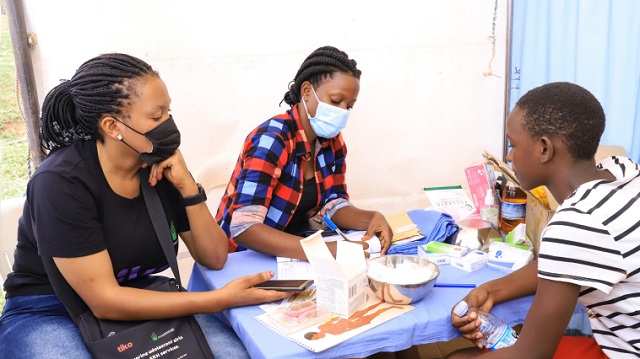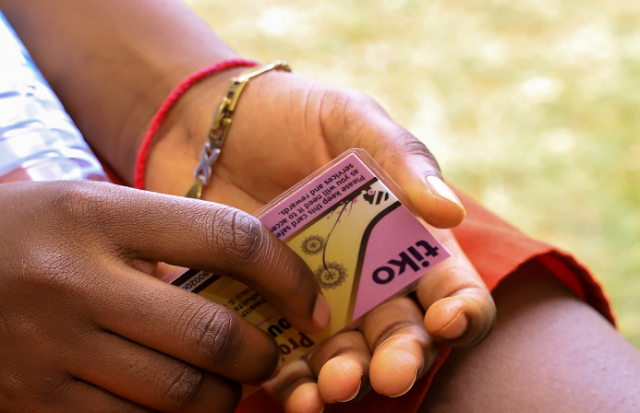
New digital platform aims to help the girls get contraceptives and information
Kampala, Uganda | PATRICIA AKANKWATSA | Katanga is an urban slum situated on a flood plain between Makerere University and Mulago Hospital It is home to approximately 20,000 people, living in wood, mud and brick homes.
Slim channels weave between these structures, often alongside open sewage, mostly stagnant until heavy rains and the subsequent floods come to disperse the sewage throughout the pathways and, not uncommonly, in residents’ homes.
Lots of small businesses selling fruit and vegetables, porridge, rice and beans, chapati and eggs; there are gyms, cinemas, mechanics, hairdressers, tailors, bakers and butchers; electrical, clothes and shoe shops, as well as those who make bricks, beds, homes and coffins.
Almost everyone works out the front of their homes, speaking, arguing with their neighbours and customers, multiple sound systems with a heavy beat providing a layered soundtrack to each corner of Katanga, and a medley of foods creating a unique aroma throughout the day and late into the evening. People are drinking the local Waragi spirit, a bottle of soda or black tea.
There is plenty of joy, parents laughing, children chasing each other and parents and children alike playing various board games.
Most of the young girls (15-24) around this place are either breastfeeding or pregnant. There are high rates of teenage pregnancies in urban slums mainly because of lack of access to sexual reproductive health (SRH) services and information.
According to the Uganda Bureau of Statistics (UBOS), almost a quarter (one in four or 25%) of Ugandan women has given birth by the age of 18.
This is why the Aga Khan Foundation Uganda and Triggerise, a non-profit company developed the user-centric digital platform, TIKO, to increase youth’s access to reproductive health services as well as empower young people with relevant information to fight unplanned teenage pregnancies.
The TIKO Platform is a membership platform that connects members to a range of health and wellbeing offers for them to explore on their terms.
It is accessible to any adolescent girl between 15-19 with a mobile device through social media platforms like Facebook, WhatsApp and Twitter, SMS, and membership cards for those without mobile phones.
The platform is part of the In Their Hands (ITH) Uganda programme which is an expansion programme adapter.
After the successful implementation of the In Their Hands Kenya programme in the last three years, the programme aims at increasing the uptake of contraceptive services among adolescent girls (15-19) to reduce the incidence of unintended pregnancies.
The programme is funded by the Aga Khan Foundation (AKF) and the Children’s Investment Fund Foundation (CIFF) of which AKF Uganda and Triggerise are implementing partners. The ITH programme is targeting 20,000 adolescent girls between 15 -19 years in Arua and Kampala districts for one year.
Rowena Kamasai, the programme lead, says that they hope to see a future where adolescent girls are no longer burdened by unplanned pregnancies but are adapting to healthy behaviours and self-efficacy.
According to Kamasai, the young people can access quality adolescent reproductive health services and work with communities, they hope to remove barriers to accessing quality comprehensive health services for teenage girls.
“Through immersive research with adolescent girls, health workers as well as line ministry and local government officials, it is noted that despite a supportive policy environment there are still limitations regarding quality adolescent-friendly service provision,” she said.

Challenges young girls face accessing SRH
Charles Owekmeno, the National Coordinator of SRH Alliance Uganda says that most adolescent girls and young women lack information regarding their sexual health, what services are available and who and where to go if they experience violations such as sexual assault.
“In instances of sexual assault, fear and stigma prevented adolescent girls and young women from going to the police, and instead, disputes were handled informally between families,” Owekmeno says.
Irene Nakayiza a 17-year-old mother of one and a beneficiary of TIKO says that she understands one may visit a health facility for seeking SRH information, even though when not anticipating having sexual intercourse.
“But, you know, our community may regard you as if you have already indulged in premarital sexual activity if someone sees you seeking the service,” she says.
“When I think of visiting a health facility for SRH reasons, the thing that comes into my mind is what the community talk behind me. Thus, I usually send someone to buy an emergency birth control pill from a pharmacy rather than visiting a health facility by myself,” she adds.
She says on occasions when she has gone to the pharmacy to buy the drugs, she says they are often too pricey for her.
“When I reach the pharmacy where am to buy the drugs from, the drugs are Shs.30,000and I only have Shs.10,000 in my bag, so I find that medication too expensive,” she says.
She says she often resorts to using unregulated traditional medicine.
“In that case, I will just go and pluck some “omululuza” and “kamunye” and I drink because it is the cheaper option that will help me,” she says.
Owekmeno says there is a poor habit of communication between adolescents and their parents when it comes to sexual health matters.
“Adolescents are ashamed and fear asking for parental approval when intending to visit the health facility for SRH purposes,” he says, “They usually choose to remain silent regarding their sexual health issues or discuss them to close friends who themselves have limited information, rather than engaging their families because they fear being assumed of being sexually active,”
Jackson Chekweko, the Executive Director of Reproductive Health Uganda says that money and poverty play a significant role in the violation of adolescent girls’ and young women’s rights.
“Young girls are taken advantage of when trying to better their education or obtain jobs,” he says.
High alcohol and drug use amongst men is also one of the many underlying causes of domestic violence toward women.
“Sexual domestic violence is high in areas like this. For us men, the rate of drinking alcohol and drug abuse you know what these result into. When they go back home, they harass women, because of poverty and other things. So, our sisters have got problems because domestic violence is high and rape,” Chekweko noted
****
 The Independent Uganda: You get the Truth we Pay the Price
The Independent Uganda: You get the Truth we Pay the Price


